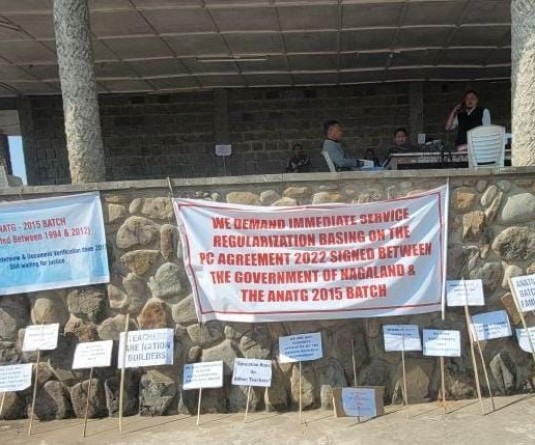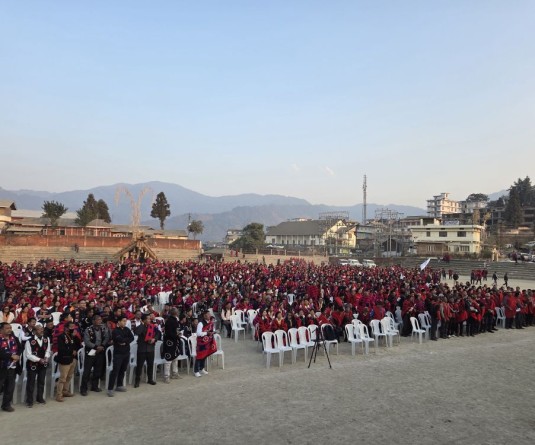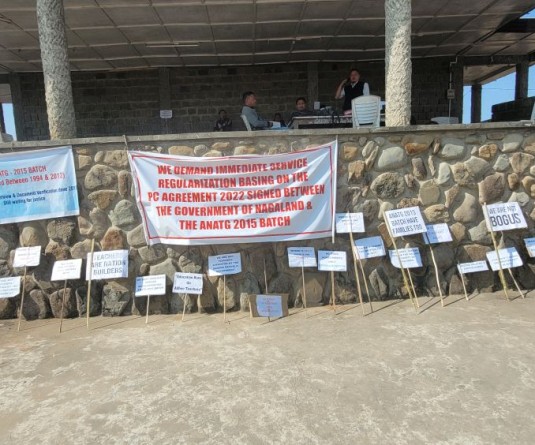
Morung Express News
Kohima | June 22
The Home Guards in India was established in 1946 to serve as an additional help to the police force. Although a voluntary organization, mostly intended as a part time work for citizens, being a Home Guard in Nagaland is a full time job.
Considered as wage laborers, Home guards in Nagaland earn Rs. 150 per day for their full time duty. It may be noted that from July 1, 2015 the National Floor Level of Minimum Wage has been raised to Rs 160 per day.
“Our duty is 24 hours duty. There is no promotion, no pay enhancement,” says Caleb (Name Changed) a Home Guard posted with the Traffic Police in Kohima, who wished to remain anonymous. He had joined as a Home Guard in 1995.
With unemployment rising high in Nagaland State, many join the voluntary organisation sometimes with the hope of getting inducted into a regular job or perhaps having their wage enhanced.
Another Home Guard, Remy (Name Changed) who was inducted in 1996 and posted with the Power Department in Kohima, while wishing to remain anonymous states: “Till today, there has not been any raise in our salaries. We cannot even take leave because our salaries will be deducted. The most disheartening part is that we can’t even take up other part time jobs even though we cannot survive on our Home Guard wage alone.”
He further informs that even though the duty of the Home Guards is part time, they are being used by most units to the maximum. Home Guards are assigned in Traffic duty, as house guards in guesthouses, various government departments, and banks wherever there is a shortage of police personnel. In Nagaland there are more than 2100 Home Guards deployed in all 11 districts. Despite their tireless service, the Home Guards do not have benefits, pensions or welfare assistance apart from their Rs 150 per day wage.
The Nagaland Home Guards Organization was established on March 1, 1998 by an ordinance of 1987 under the Home department. Civil Defense in Nagaland, which preceded the Home Guards, was reactivated, where both organizations complement each other and co-existed under a common Head of Office with the Commandant General HGs as the Director of Civil Defense.
The Nagaland Home Guards Acts of 1988 was passed by the State Legislature on May 12, 1988. They perform the duty of any other police personnel in sunshine or rain, says Medozhalie Pienyü, DIG Home Guards. The only difference, and a significant one at that, is their wage. The home guards are paid Rs 150 rupees daily for their 24 hours duty.
“Our pay is low but the respect is much lower,” laments Remy. Home Guards who have families face the problem of earning for their family and providing education to their children.
Meanwhile, Caleb reveals: “We do not have any pension. When we die, the department will provide us a coffin. That’s it. For the home guards working in offices, unless the Director releases the order, they cannot leave.” Parking duty is the longest, he adds.
A few years back, some Home Guards attempted to form a union in order to highlight their plights to the government. However their attempts were reportedly suppressed by higher officials on the grounds that the voluntary organization is prohibited by law to form unions. Caleb further claims that two leaders of the union were laid off from their jobs after they formed a union to petition the welfare assistance of the Home Guards.
The chance of Home Guards getting inducted into the police force is also very less, he says. It is only the few privileged, the ones who have ‘backgrounds’ that have higher chances of getting regular jobs.
“Upai nai. We do not have the power to speak out. We are just wage labourers. If the higher ups remove us, we have no other way to earn,” he adds.
Roles of Home Guards
In Nagaland, the Home Guards assist in maintenance of internal security, law and order duties besides providing protection to the important installations for both Central and State establishments, banks, VIP house guards, and traffic duties especially in Dimapur, Kohima, Mokokchung and Wokha.
The Home Guards also assist the community in emergencies such as air raids, fire, floods, epidemics etc. At present there are 240 cadres working in the State Disaster Response Force (SDRF) for the State Disaster Management Authority in Nagaland.
And despite providing these crucial services to the State, the Government and the people, the Home Guards have so far been left in a limbo as far as their wages and benefits are concerned.





.jpg)
